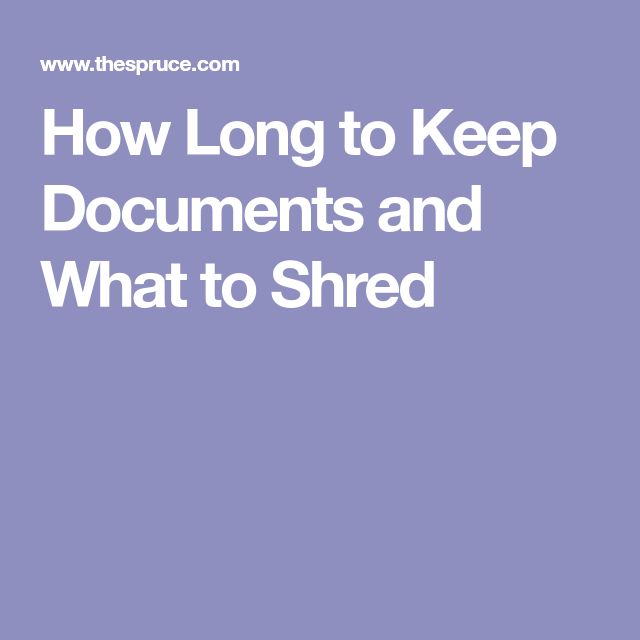How Many Years of Paperwork Should You Keep?

Managing paperwork is an essential but often daunting task. Whether it's for tax purposes, recordkeeping, or simply peace of mind, knowing how long you should retain various documents is crucial. In this article, we'll delve into the recommended retention periods for various types of paperwork, offering insights that cater to individuals and small business owners alike.
Why Retention Periods Matter

Before we get into specifics, understanding why retention periods are important can clarify their necessity:
- Legal Compliance: Certain laws and regulations require you to keep documents for specified periods.
- Evidence and Dispute Resolution: Having records can be invaluable if you ever face audits, legal disputes, or other claims.
- Reference and Planning: Keeping certain documents helps in financial planning, tracking financial history, or even legacy issues.
Retention Periods by Document Type

| Document Type | Retention Period |
|---|---|
| Tax Returns | 7 years |
| Bank Statements | 3 to 7 years |
| Pay Stubs | 1 year (unless needed for proof of employment or for taxes) |
| Investment Records | 6 years after the sale |
| Property Records | Forever |
| Home Improvement Receipts | 3 years (or indefinitely if related to tax deductions) |
| Insurance Policies | As long as active, plus 2 years |
| Medical Bills and Insurance Forms | 5 to 10 years |

Tax Documents

The IRS can audit returns up to three years after filing, but if they find an under-reporting of 25% or more, they have up to six years to audit. Keep:
- Tax returns and supporting documents for 7 years.
Bank and Financial Records

Keeping records of transactions helps with tracking financial health or dealing with issues like unauthorized transactions:
- Bank statements for 3 to 7 years, particularly if related to taxes or a significant transaction.
Pay Stubs

Pay stubs should be retained for:
- 1 year if you have no disputes or significant changes in employment status. Otherwise, align with your tax records.
Investment Records

For capital gains or losses, keep:
- Records of investments for 6 years after the sale.
Property Documents

Retain all records related to the purchase, sale, or improvement of property:
- Forever as these documents can affect taxes, estate planning, or future sales.
Home Improvement Receipts

These can impact the tax basis of your property:
- Keep them indefinitely if they’re for significant tax deductions.
Insurance Documents

Insurance policies protect your assets and can influence claims or renewals:
- Keep for the policy’s duration plus 2 years for any claims or renewals.
Medical Records and Insurance

Medical records are essential for understanding your health history:
- Retain them for 5 to 10 years to monitor conditions, claim insurance, or for tax purposes.
💡 Note: Always check with your country's tax laws or legal advisors as retention periods can differ based on jurisdiction and specific situations.
Digital vs. Physical Documents

With the advent of digital documentation, storage has become easier. Here are some tips:
- Scan Important Documents: Create digital copies to save space and ensure they’re safeguarded against physical damage.
- Secure Digital Storage: Use cloud storage or external drives, ensuring regular backups and encryption where necessary.
- Shredding: Physical documents not retained should be shredded to protect personal information.
Organizing Your Paperwork

Here’s how to keep your paperwork manageable:
- Categorize: Use categories like financial, personal, legal, medical, and business documents.
- Label and Date: Clearly label files and documents with dates for easy reference.
- Regular Review: Annually, or when significant events occur, review and purge documents past their retention period.
🔍 Note: Using a document management software can help automate retention periods, reducing the risk of keeping documents for too long or destroying them prematurely.
Understanding how long to keep various documents can save you from potential legal and financial headaches. By adhering to recommended retention periods, you'll stay compliant, be prepared for audits, and facilitate smooth reference when needed. Organize your paperwork wisely, leverage digital tools, and keep an eye on both retaining necessary documents and safely disposing of those no longer needed.
Why is it important to keep financial documents?

+
Financial documents provide a historical record of your income, expenses, and investments, which are essential for tax filing, legal disputes, and financial planning.
How should I dispose of documents I no longer need?

+
Shred any documents containing sensitive information to prevent identity theft. Consider using professional shredding services for large quantities.
Can I store all my documents digitally?
+Yes, but ensure you have secure backups and adhere to laws regarding digital storage and retrieval of documents. Original copies might still be necessary for certain official purposes.
What happens if I don’t keep documents for the recommended period?
+You could face fines, audits, or legal challenges. Keeping records as recommended by law or best practices can save you from these complications.
Is there any situation where documents should be kept longer than the standard retention period?
+Yes, if involved in legal action, medical concerns, or if there’s a significant financial transaction or property issue where documentation can be crucial.